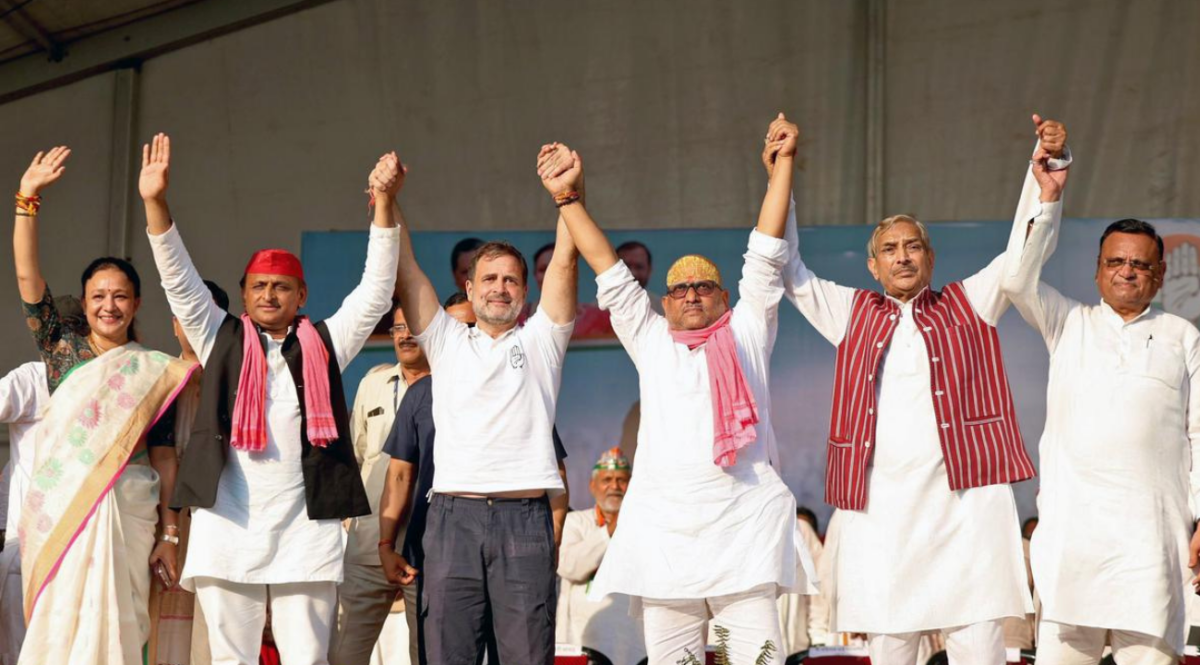Table of Contents
The atmosphere in the Lok Sabha on the first day of its 18th session was markedly different from the previous decade. The opposition, now stronger in numbers and more vocal, made its presence felt both inside and outside the House. The BJP, which had previously left the new Parliament building in February with high spirits and chants of “Ab ki baar 400 paar,” found itself somewhat subdued, with only a brief moment of enthusiasm when Prime Minister Narendra Modi, elected for a third consecutive term, took his oath amid chants of “Modi Modi.”
Reflecting on Past Wins and Present Strength
The transformation in the opposition’s demeanor was palpable. Lal Krishna Advani’s famous remark after the 1989 Lok Sabha elections, “The winner comes second,” seemed to resonate with the current opposition. Back then, the BJP had risen from 2 to 85 seats under Advani’s leadership, marking the beginning of its ascent to power. Now, opposition MPs, jubilant and confident, occupied more than a third of the House benches, a significant increase from their marginal presence in previous years.
Leaders like Akhilesh Yadav of the Samajwadi Party (SP), whose party’s seats increased from five to 37, made symbolic gestures by placing senior members like 79-year-old Awadhesh Prasad in prominent positions. The atmosphere in the House was indicative of a newfound confidence and unity among the opposition ranks.
Protests and Demonstrations
Outside the House, opposition MPs from the Congress, DMK, and TMC held a protest, brandishing red-cover copies of the Constitution at the spot where Mahatma Gandhi’s statue once stood. They then marched into the House to take their oaths. Akhilesh Yadav led his party members, all donning red stoles and carrying copies of the Constitution, onto the floor of the House.
Inside, the mood was one of defiance and determination. Opposition members waved copies of the Constitution and chanted slogans like “Long live the Constitution” and “We will save the Constitution” as Modi and Home Minister Amit Shah took their oaths. This was a clear echo of their campaign rhetoric, which had warned that a BJP victory with over 400 seats could lead to changes in the Constitution.
The opposition also united in protest against alleged irregularities in competitive exams such as NEET-UG and UGC-NET, chanting “NEET, NEET” and “Shame, Shame” when Education Minister Dharmendra Pradhan approached the podium. They have announced plans to raise these issues in Parliament, signaling a combative approach to the new session.
Tensions and Traditions
The opposition’s assertiveness was evident from the start of the proceedings. When pro tem Speaker Bhartruhari Mahtab called the senior opposition MPs to administer the oath, none stepped forward. The opposition had decided to withdraw them from the list of presiding officers, citing that Congress MP K Suresh, the most senior member, should have been given the honor. Suresh stood to voice this objection, but it was not allowed by the Chair.
The session also saw moments of humor and tradition. TMC’s Kalyan Banerjee lightened the mood by questioning the division of the House for oath-taking and singing “Dost dost na raha, pyaar pyaar na raha” when JD-U’s Rajiv Ranjan took his oath. Banerjee also thanked Union Minister Giriraj Singh, humorously crediting him for helping the opposition gain more votes.
Newly elected MPs took their oaths in various languages, reflecting India’s linguistic diversity. Suresh Gopi, an actor-politician and Union Minister, invoked deities in Malayalam before taking his oath. Traditional attire added color to the proceedings, with Assam MPs wearing white-and-red gamchas and TMC MP Kirti Azad in a Bengali dhoti. Union Minister Anupriya Patel’s red-and-black sari led to playful banter with DMK MPs, who commented on the colors associated with their party.
A New Dynamic in Parliament
MPs began arriving at the Parliament building complex early, with many new members capturing the moment with photographs and introductions. Those returning were eager to reconnect. Kanimozhi, carrying a book gifted by a Kerala MP, was seen engaging in conversations. Under opposition fire, Pradhan shared a nostalgic moment with Jual Oram about their first visit to Parliament as ABVP leaders in 1997.
As the new session unfolds, the opposition’s strengthened presence and vocal stance suggest a dynamic and possibly contentious period ahead in the Lok Sabha. The initial day’s proceedings highlighted their readiness to challenge the ruling party on various fronts, setting the stage for a robust democratic process.



